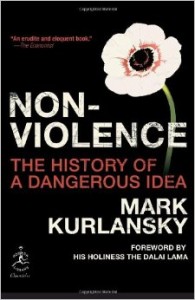I’ve received a fair bit of flack over a post I wrote last week that essentially blames the recent “terrorist” attacks in Canada on our foreign policy, namely, our decision to join the coalition launching air strikes against ISIS. I argued that had we chosen to pursue non-violent and humanitarian approaches to ISIS and their victims instead, these violent acts wouldn’t have occurred, because there would be no reason to target us.
To bolster this claim, I pointed out that prior to our involvement in this war, the number of terrorist attacks on Canadian soil was essentially zero–particularly when you count terrorist attacks perpetuated by those who sympathize with foreign terrorist groups. The only other incident, which was thwarted before it could happen, took place while we had committed ourselves to war in Afghanistan, so it can also be viewed as a retributive act inspired by our foreign policy. If you’re a real stickler, you may want to point out the Air India bombing in 1985, but this is merely an example of a foreign conflict spilling across borders rather than a direct attack on Canada as a country. My overall point was that the moment you act out in violence–either aggressively or defensively–you essentially legitimize the tactic and make yourself a target.
Incidentally, this is why I believe Jesus advises us to turn the other cheek. If someone strikes us and we strike back, it appears to legitimize their initial claim against us, whether it was valid or not. However, if we refuse to respond in kind, not only do we begin to raise questions about our guilt, we put the aggressor in an awkward position where if they strike us again (using their “unclean” left hand in Jesus’ analogy), rather than a self-justifying act, their violence actually forces them to cede the moral high ground, because the aggressive, predatory nature of their actions becomes clearer in contrast with our refusal to participate.
Apart from questioning the validity of my claim regarding the number of terrorist attacks that have actually occurred here, others accused me of being overly simplistic. After all, neither of the individuals who committed the acts of terror were affiliated with a terrorist network, so who knows why they did what they did? Apart from their jihadist sympathies, their one point of commonality is that both men were denied passports just prior to acting out. So this seems to be the most proximate cause. Not that everyone who is denied a passport goes on a shooting rampage, but for both men, clearly this was the last straw. Perhaps they never intended to target Canada, but once they were denied an opportunity to pursue their jihadist dreams overseas, they decided to express their frustration in a symbolic way right here at home. So you could say their violent acts were preceded by a non-violent attempt to thwart evil, which could certainly be seen as problematic for my thesis that violence begets violence but non-violent acts break the cycle.
The best I can say in response is that both Martin Couture-Rouleau and Michael Zehaf-Bibeau seem to have suffered from mental illness, so they can hardly be classified as rational actors or free moral agents. I might also point out that just as violence doesn’t automatically beget a violent response–otherwise no one would ever be able to break the cycle–non-violent acts don’t automatically lead to a non-violent response. Often, it takes repeated attempts before the light comes on and people realize they are caught up in a zero sum game.
The third main charge against my thesis is that it is naive. How clueless could I be to think anything but violence will work against a group like ISIS? It’s the only language they understand. People are quick to jump straight back to World War II. Where did appeasing Hitler get us?
In response to this point, first of all I would say that if anyone is naive, it is those who believe we are involved in Iraq right now for anything but economic and strategic reasons. Governments can cloud the issue in humanitarian concerns all they want, but that’s only because it’s the most effective way to sell a war that is clearly not in our best interest. As others have pointed out, there are all sorts of vicious groups rampaging across places like Nigeria, the Congo, Somalia, Uganda and elsewhere. There are also nations like Saudi Arabia that routinely behead, torture and otherwise brutalize their citizens. These groups and states have been at it much longer than ISIS, and they are just as brutal, if not worse. The question is, why aren’t we launching air strikes against them?
The answer is that at present, none of these other groups threaten our economic or strategic interests. As for Saudi Arabia, well, they’re our ally after all…
Thanks to non-stop propaganda from our governments and horrific recruiting videos from ISIS, people have become convinced that the fight against ISIS is akin to the fight against the Nazis, a clear-cut case of good vs. evil. The question we fail to ask in both cases is, what allowed the Nazis and ISIS to rise to power in the first place?
The answer in both instances comes down to previous violent acts. If the Allies hadn’t forced Germany to accept full financial responsibility for World War I and utterly bankrupted and demoralized the country, someone like Hitler would never have risen to power. Instead, the Allies created the perfect climate for Hitler to take the reins and lead his country on a violent crusade to regain its former glory. At every step along the way, both the German people and foreign powers could have stopped his plans through non-violent means–at the polling booth, through non-participation in the military, economic sanctions, and by opening our borders to Jews and other refugees fleeing the Reich. Instead, the majority of German people bought into his vision (because violence served them so well in WWI!), and the Allies essentially stood and let it happen until their own interests were threatened.
The only reason violence didn’t erupt again out of Germany and Japan following WWII is because we made it politically and economically impossible for them to re-arm. Contrary to our actions following WWI, rather than demoralize and punish these nations for their aggressive actions, we helped them rebuild, thus eliminating the temptation to turn to violence as a means of regaining their identity. As a result, both Germany and Japan have become economic powerhouses and constructive participants in the global community. Although this was preceded by violence, the cycle of violence was ultimately achieved through non-violent means.
As for ISIS, they’re a clear-cut example of Martin Luther King’s observation that “violence solves no social problem: it merely creates new and more complicated ones.” We are now back in Iraq for the third time in the past 24 years. The question is, are we back in Iraq because violence worked so well the first couple of times or because it so utterly demoralized and destabilized the region that the situation was practically begging for a group like ISIS to come in and fill the vacuum? What sort of situation are we going to be looking at 24 years from now? To think we can sow violence and reap peace is naiveté of the first order. It’s like a gambler doubling down on his bets over and over again. This time it’s got to work… 
A final line of criticism runs along the lines of, “If not war, then what? Do you expect us to stand by and do nothing?” This is perhaps the most frustrating critique, because it implies that violence is the only option when we are confronted with violence. It represents an utter failure of imagination, which is alarming. It also demonstrates a marked ignorance of all that non-violence has achieved throughout history.
Surely in our personal relationships we don’t resort to violence to resolve conflicts. We employ all sorts of creative means to prevent conflicts before they happen and to mediate them when they do occur. Why when someone brings violence against our nation do we suddenly act as if none of these options are available? Perhaps it’s because pursuing these options–cutting off the flow of arms and the sale of oil on the black market, for example–would reveal our own complicity in propping up the very enemy we claim to oppose.
Part of the reason is that both ISIS and the West want us to believe there’s no negotiating with these people. Such a depiction serves ISIS, because portraying themselves as the biggest and baddest group on the block is a great recruitment tool. It also serves the West so that we won’t question their motives when they lead us into war. It allows them to frame the war in moral rather than economic or political terms. Despite what we’re told, violence is not our only option when it comes to ISIS, and it is far from our best option. In fact, it is the only option that is virtually guaranteed to produce more of the same. History bears this out over and over and over again in Iraq and virtually everywhere else it has been tried throughout the world.
Furthermore, I should point out that the majority of these criticisms have come from Christians. So I have a question for them: If I’m naive to oppose violence, what does that say about Christ, who consistently opposed violence throughout his life and teachings–despite living in a territory occupied by invaders who routinely brutalized his people? Put another way, who was more naive, the man on the cross or the people who put him there, thinking such an act would solve all of their problems?
Oct. 28 addendum: For some hard data on the effectiveness of non-violent resistance, I encourage you to read this article, which details the finding of a study that compared over 300 non-violent and violent resistance campaigns from 1900-2006. They found that the success of non-violent campaigns far outweighed that of violent campaigns in terms of achieving their goals. I should also note that the nonviolent tactics employed include symbolic protests, economic boycotts, labor strikes, political and social non-cooperation, and nonviolent intervention. Far from passive, these tactics are highly disruptive and unsettling for the target of the resistance group. A brief excerpt:
Our findings show that major nonviolent campaigns have achieved success 53 percent of the time, compared with 26 percent for violent resistance campaigns. There are two reasons for this success: First, a campaign’s commitment to nonviolent methods enhances its domestic and international legitimacy and encourages more broad-based participation in the resistance, which translates into increased pressure being brought to bear on the target. Recognition of the challenge group’s grievances can translate into greater internal and external support for that group and alienation of the target regime, undermining the regime’s main sources of political, economic, and even military power.
Second, whereas governments easily justify violent counterattacks against armed insurgents, regime violence against nonviolent movements is more likely to backfire against the regime. Potentially sympathetic publics perceive violent militants as having maximalist or extremist goals beyond accommodation, but they perceive nonviolent resistance groups as less extreme, thereby enhancing their appeal and facilitating the extraction of concessions through bargaining.











